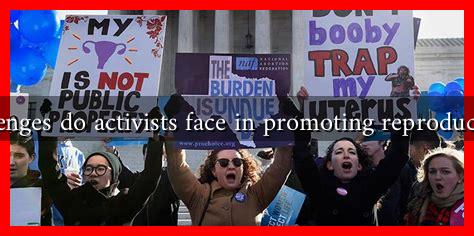-
Table of Contents
What Challenges Do Activists Face in Promoting Reproductive Rights?
Reproductive rights encompass a range of issues, including access to contraception, abortion, and comprehensive sex education. Activists advocating for these rights face numerous challenges that can hinder their efforts. This article explores the multifaceted obstacles that reproductive rights activists encounter, providing insights into the complexities of this critical social issue.
Legal and Political Barriers
One of the most significant challenges activists face is navigating the legal and political landscape surrounding reproductive rights. Laws and regulations can vary dramatically from one region to another, often influenced by cultural and religious beliefs.
- Restrictive Legislation: Many countries and states have enacted laws that severely limit access to reproductive health services. For instance, the U.S. Supreme Court’s decision in Dobbs v. Jackson Women’s Health Organization (2022) overturned the federal right to abortion, leading to a patchwork of state laws that either protect or restrict access.
- Political Opposition: Activists often face strong opposition from political groups and individuals who advocate for anti-abortion policies. This opposition can manifest in the form of lobbying, public campaigns, and even legal challenges against reproductive health organizations.
- Funding Cuts: Government funding for reproductive health services, including family planning and abortion services, has been cut in many areas. For example, the Global Gag Rule restricts U.S. federal funding for international organizations that provide or promote abortion services.
Social and Cultural Challenges
Beyond legal hurdles, activists must also contend with social and cultural attitudes that can impede progress in reproductive rights.
- Stigma and Misinformation: Reproductive health issues are often shrouded in stigma, leading to misinformation and fear. Activists must work tirelessly to educate the public and dispel myths surrounding reproductive health.
- Religious Opposition: In many communities, religious beliefs play a significant role in shaping attitudes toward reproductive rights. Activists may face backlash from religious groups that oppose contraception and abortion, complicating their outreach efforts.
- Gender Inequality: Gender norms and inequalities can further complicate the fight for reproductive rights. Women, particularly in patriarchal societies, may face additional barriers in accessing reproductive health services due to societal expectations and discrimination.
Economic Challenges
Funding is a critical component of any activist movement, and reproductive rights activists often struggle to secure the necessary resources to sustain their efforts.
- Limited Resources: Many reproductive health organizations operate on tight budgets, which can limit their ability to conduct outreach, provide services, and advocate for policy changes.
- Competition for Funding: Activists often compete with other social causes for limited funding. This competition can dilute resources and hinder the effectiveness of reproductive rights campaigns.
- Economic Inequality: Economic disparities can affect access to reproductive health services. Low-income individuals may struggle to afford contraception or abortion services, making it essential for activists to address these economic barriers.
Technological and Communication Barriers
In the digital age, technology plays a crucial role in activism. However, activists promoting reproductive rights face unique challenges in this realm.
- Online Harassment: Activists often encounter harassment and threats online, which can deter individuals from participating in advocacy efforts. This harassment can create a hostile environment that stifles open dialogue about reproductive rights.
- Access to Information: In some regions, access to reliable information about reproductive health is limited. Activists must work to ensure that accurate information is available and accessible to all individuals.
- Digital Divide: Not everyone has equal access to technology, which can create disparities in outreach efforts. Activists must find innovative ways to reach marginalized communities that may lack internet access.
Conclusion
Activists promoting reproductive rights face a myriad of challenges, from legal and political barriers to social stigma and economic constraints. Despite these obstacles, the fight for reproductive rights remains crucial for ensuring that individuals have the autonomy to make informed choices about their bodies and health. By understanding these challenges, supporters of reproductive rights can better strategize and mobilize efforts to create a more equitable society.
For more information on reproductive rights and the ongoing efforts to promote them, consider visiting organizations such as Planned Parenthood or the Guttmacher Institute.


